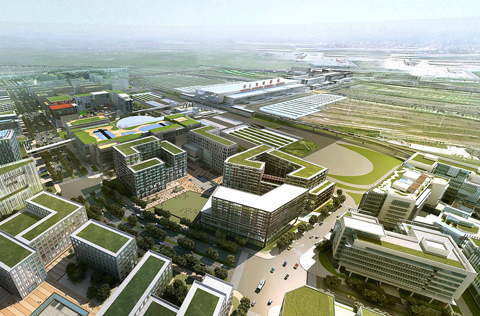Home>News
Shanghai a hot spot for innovation
More than one word is required to properly capture Shanghai's multiple facets - financial center, seaport, industrial cluster, commercial hub.
To inject vitality into businesses, Shanghai released 27 measures for sound development of the private sector in November. On top of a 50-point circular promoting the real economy, industry-specific guidelines were laid out for critical sectors such as integrated circuits, artificial intelligence and biomedicine.
According to the municipal government in January, industrial investment last year was up 17.7 percent year-on-year, the most growth in a decade. Construction has started on five investment projects, each valued at more than 10 billion yuan ($1.48 billion).
The strategic embrace of the latest technologies for AI, robotics and cloud-based computing has made Shanghai "a vital center for advanced technology leadership", said Ulrich Spiesshofer, CEO of Swiss industrial conglomerate ABB Group, which announced a $150 million investment in October to build its "largest and most advanced" plant in Shanghai.
Committed to reform, Shanghai has never spared its efforts in carrying out institutional experiments, authorities said. It has successfully launched innovative financial products such as crude oil futures and commodity options for natural rubber, cotton and corn.
In the latest development, officials released detailed regulations last month on the much-anticipated science and technology innovation board, a new bourse proposed by Xi during the China International Import Expo in November. The eased listing requirements are expected to serve tech companies that have exhibited high growth potential but are yet to report financial gains.
"The moves showed that the government's top-down institutional design is both innovative and pragmatic, as a problem-oriented approach allows for timely and flexible policy adjustment," said Sheng Hainuo, a partner at management consultancy Oliver Wyman.
Innovation is also a magnet that attracts scientific talent. The establishment of multiple research institutions has fostered achievements such as a new drug candidate for the treatment of Alzheimer's disease and the development of a hyperspectral integrated observation satellite.
The city has also made progress toward becoming an AI hub. It hosted the inaugural World Artificial Intelligence Conference in September, an event that led to the signing of a series of industrial cooperation agreements and business contracts.
"Shanghai's unique advantages include a concentration of industrial partners and strong government support," said Alain Crozier, chief executive officer of Microsoft in China, referring to the city's bid to expand the AI industry to more than 100 billion yuan by 2020 through specialized funds, demonstration zones and public platforms.
Shanghai has also been a launchpad for novel business models. For instance, an innovation center on consumer insights was established in the city. Backed by e-commerce behemoth Alibaba, it will distill customer data with a view to creating products tailored to their tastes.
Thanks to such initiatives, many foreign retailers have chosen Shanghai for their China debuts. According to local authorities, some 835 brands chose Shanghai for the launch of their first shops in China, the world's largest consumer market, last year.
"Shanghai is no doubt the top choice for implementing the New Retail strategy, or the merger of online and offline commercial resources," said Jing Jie, president of Alibaba's online marketplace Tmall. "It has all the innovation in business models, products and technologies needed for new store openings."
hewei@chinadaily.com.cn


